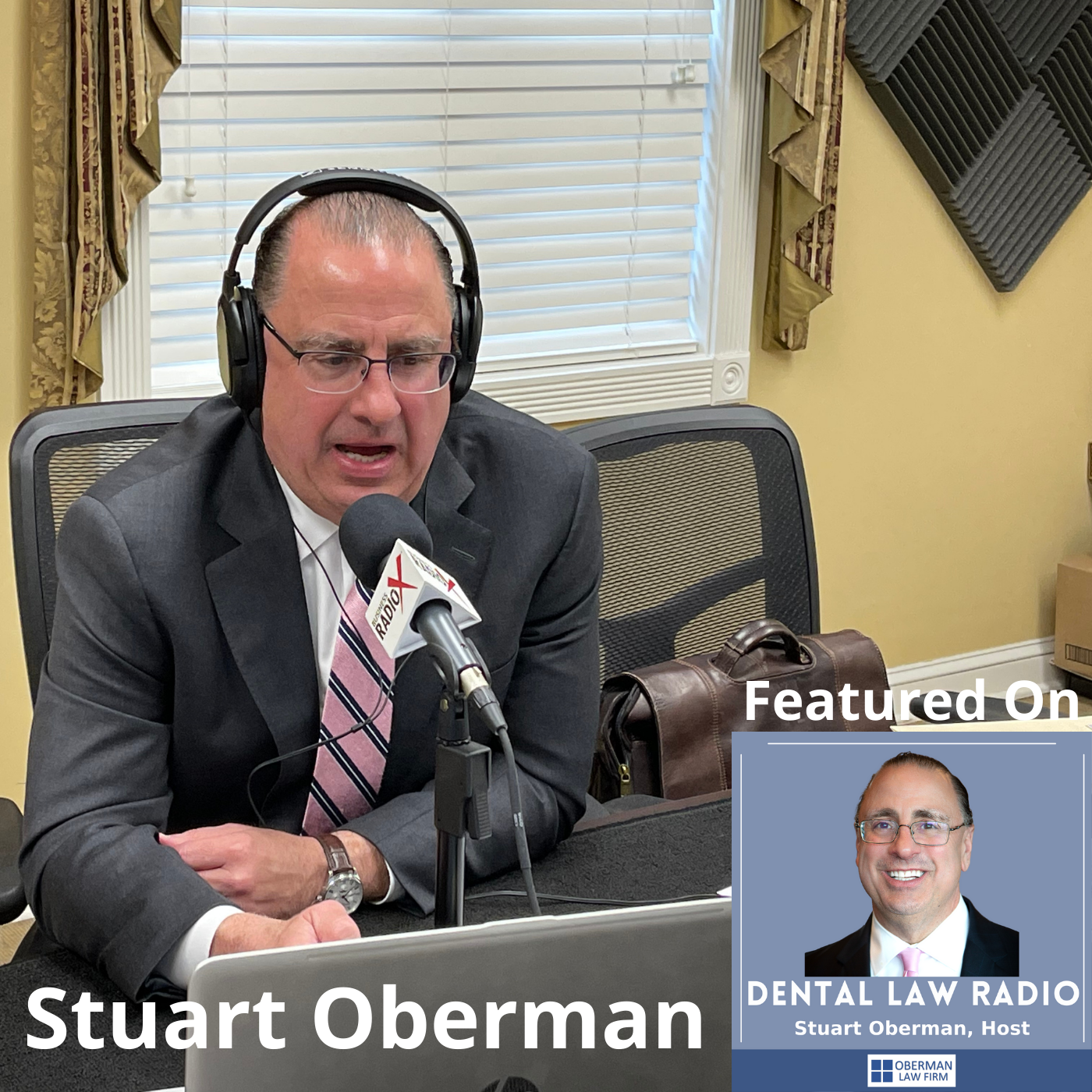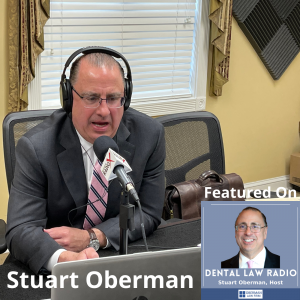
COVID-19 and OSHA Compliance (Dental Law Radio, Episode 2)
On this episode of Dental Law Radio, host Stuart Oberman discusses current issues in OSHA compliance resulting from the COVID-19 pandemic, the risks of non-compliance for dental practice owners, and much more. Dental Law Radio is underwritten and presented by Oberman Law Firm and produced by the North Fulton studio of Business RadioX®.
TRANSCRIPT
Intro: [00:00:02] Broadcasting from the Business RadioX Studios in Atlanta, it’s time for Dental Law Radio. Dental Law Radio is brought to you by Oberman Law Firm, a leading dental-centric law firm serving dental clients on a local, regional, and national basis. Now, here’s your host, Stuart Oberman.
Stuart Oberman: [00:00:26] And welcome everyone to Dental Law Radio. Today’s topic, COVID-19, OSHA Compliant. So, during this whole period of about a year, what we saw was a massive, massive, massive problems with OSHA. You know, I would say this is not your father’s OSHA. And I’ve thought about this for a while where, you know, years ago we’re worried about bloodborne pathogens and needle sticks and how to dispose of items. All those are important. But what’s happened is, is through this whole process, our doctors have developed and continue to develop staff problems.
Stuart Oberman: [00:01:06] So, what happens is, I always tell our doctors, “Disgruntled employees are going three places in the medical field, OSHA, HIPAA, Department of Labor, State and Federal.” So, what happens is that our doctors, historically, botch how to handle OSHA complaints. And a lot of times they are easily handled if you get a grip on it pretty quick. But what happens is, you get the letter, they don’t know where to go, what to do. The office manager doesn’t know what to do because she’s not trained. The staff doesn’t know. Because now, all of a sudden, you’ve got the Hygiene Department, who’s your office manager, who definitely has not been trained on OSHA what to do.
Stuart Oberman: [00:01:52] So, I don’t care how big you are, whether you’re one practice, 300,000, or 40 practices, 40 million, you’ve got to have an OSHA system for regulatory matters. So, we want to talk a little bit about today as to what you do, and we’re seeing an uptick of this more so than we’ve ever seen before.
Stuart Oberman: [00:02:14] You know, through the COVID period – I know everyone’s trying to move out of the COVID period. But I think we got to look back and say, “Hey, what happened? What didn’t work? What worked?” – on the OSHA side, one of our biggest areas that we saw was our doctors were not compliant. They didn’t know how to deal with it. They didn’t have a system when they were running normal, if you will. And they definitely didn’t have a system during COVID-19, especially when they were shut down.
Stuart Oberman: [00:02:41] So, what happens to this whole process of getting an OSHA complaint? What is it? So, you’re going to get a letter from OSHA. OSHA is a massive governmental agency. A bureaucracy that if it’s not handled correctly, you’re going to have some problems to deal with it, and you got to have a system in place. So, depending on how many locations you have, you’re going to get a letter to that location. Now, if it is in relation to a different location and it goes to the wrong location, you got to make sure it gets there.
Stuart Oberman: [00:03:17] We have one particular case, our doctor had three or four locations. It took three weeks to get from point A to point B. That can’t happen. That’s a disaster. So, what’s going to happen is, you’re going to get an OSHA letter. It’s going to be how is this going to be reported. And, generally, you have about five days to respond.
Stuart Oberman: [00:03:35] So, I’m going to go out on a limb that most of OSHA problems can be very easily corrected with a simple process of responding correctly. What does that mean? That means, one, you’ve got to get the document very quickly in your possession. You’ve got to get a handle on the investigation, and it is an internal investigation. So then, you have to go ahead and get your supporting documents. Which a lot of times when doctors are in a mess, they can’t find the photographs, they can’t find anything.
Stuart Oberman: [00:04:05] So then, you got to figure out what’s your corrective action. You’ve got to let OSHA know what is your corrective action. And if you don’t have a corrective action, then they will usually tell you what your corrective action is, which is never ever good. When a governmental agency tells you, one, you’ve got a problem and, two, we’re going to tell you how to fix it, that’s not good. So, we don’t want that to occur.
Stuart Oberman: [00:04:27] So, what happens if you fail to respond and you have to respond? My advice is that, a doctor, office manager, no one internally should ever respond to an OSHA complaint. That, honestly, is the responsibility of counsel. You’ve got to be experienced in this how to respond, what to respond to, what they’re looking for, what they’re not looking for. And if it’s not within the counsel’s wheelhouse, now, you’ve got two problems. One, you’re under investigation. Two, counsel botched the investigation.
Stuart Oberman: [00:05:03] So, what happens if you fail to respond? If you fail to respond, it’s very simple. The government’s going to come in there and they’re going to start digging. And when you got the government coming in and digging on anything, that’s never good. So, they’re going to want a couple of things right off the bat. They’re going to want to know your injury and illness reports. And most doctors have no idea what that is. They’ve never completed it before. We’re lucky if they have an OSHA manual that’s now 20 years old.
Stuart Oberman: [00:05:29] So then, you got to have up to date hazard communication, which is mandated. And then, again, most of our doctors have no idea what that is. It’s been in the manual 20 years ago they bought from an organization, they have no idea what it is. Then, what’s your PPE, personal protective equipment? Where’s that at? Is it up to date? That’s a huge concern. And I think it’s a concern going forward as a whole.
Stuart Oberman: [00:05:55] Our doctors did enormous job on illness ratios. The COVID-19 reports that were coming out that the dental practices, for the most part, were in about the 90 percent range of having no problems whatsoever, and that’s a huge credit. And we’re not out of the woods yet. But I don’t want to harp on COVID-19. I want to harp on the process of what needs to be done and what’s been learned.
Stuart Oberman: [00:06:22] So then, they want to know what your bloodborne pathogens procedures are. They want to confirm your entry point. They want to know what tag outs are or lockouts are. So, those are all the things you’re going to have to address. So, what do we need to do? One, you’ve got to make sure that your OSHA manual is up to date. If it’s not up to date, you need to get it up to date. And I don’t mean, you know, five years. I mean within, like, 12 months from your last publication.
Stuart Oberman: [00:06:59] Be careful what you do if you buy it from an organization, that they don’t just give you a manual and say, “Here. Open it and you’re good to go.” They have to be custom-made. Be careful what you have, because a lot of the online publications are simply statutory codes, which have no relevance whatsoever as to how to handle things day-to-day. So, it’s got to be curtailed. Get an OSHA manual. Your employees got to be trained. They got to be trained. And you’ve got to have an internal process on how to handle the complaints. It’s not if, but it’s when you’re going to get a complaint. And a process is how do I handle it? What do I do? Who do I go to? How quick do we need to get it resolved?
Stuart Oberman: [00:07:38] Because as these fires continue to stay open, the flames get hotter. And the more they dig, the more problems you’re going to have. And the key is to keep the government out of your practices as quickly as possible and out of your life as possible.
Stuart Oberman: [00:07:53] So, those are a couple of things. You know, those are a couple of things we looked at that we’re seeing a lot of things on. And if any takeaways from this, it’s have a process. Understand what the process is, figure it out. It’s not complex. Take a few minutes, train, procedures, internal matters. Those of all have got to be done correctly, succinctly, and in great detail. So, again, a couple of things, 10,000 foot view on what we need to do on OSHA.
Stuart Oberman: [00:08:26] We’re going to be talking maybe one or two other things on OSHA that I’ve been talking about for a while, that we’ve been seeing an enormous rise on for the last couple of months. So, again, thank you for joining us today at dentallawradio.com. And if you want to contact us, please feel free to do so. Our main number is 770-554-1400. Or send me an email, stuart, S-T-U-A-R-T,@obermanlaw.com. And keep joining us and we’re going to try to provide as much relevant content going forward as is possible. Have a fantastic day and thanks again for joining us.
About Dental Law Radio
Hosted by Stuart Oberman, a nationally recognized authority in dental law, Dental Law Radio covers legal, business, and other operating issues and topics of vital concern to dentists and dental practice owners. The show is produced by the North Fulton studio of Business RadioX® and can be found on all the major podcast apps. The complete show archive is here.
Stuart Oberman, Oberman Law Firm

Stuart Oberman is the founder and President of Oberman Law Firm. Mr. Oberman graduated from Urbana University and received his law degree from John Marshall Law School. Mr. Oberman has been practicing law for over 25 years, and before going into private practice, Mr. Oberman was in-house counsel for a Fortune 500 Company. Mr. Oberman is widely regarded as the go-to attorney in the area of Dental Law, which includes DSO formation, corporate business structures, mergers and acquisitions, regulatory compliance, advertising regulations, HIPAA, Compliance, and employment law regulations that affect dental practices.
In addition, Mr. Oberman’s expertise in the health care industry includes advising clients in the complex regulatory landscape as it relates to telehealth and telemedicine, including compliance of corporate structures, third-party reimbursement, contract negotiations, technology, health care fraud and abuse law (Anti-Kickback Statute and the State Law), professional liability risk management, federal and state regulations.
As the long-term care industry evolves, Mr. Oberman has the knowledge and experience to guide clients in the long-term care sector with respect to corporate and regulatory matters, assisted living facilities, continuing care retirement communities (CCRCs). In addition, Mr. Oberman’s practice also focuses on health care facility acquisitions and other changes of ownership, as well as related licensure and Medicare/Medicaid certification matters, CCRC registrations, long-term care/skilled nursing facility management, operating agreements, assisted living licensure matters, and health care joint ventures.
In addition to his expertise in the health care industry, Mr. Oberman has a nationwide practice that focuses on all facets of contractual disputes, including corporate governance, fiduciary duty, trade secrets, unfair competition, covenants not to compete, trademark and copyright infringement, fraud, and deceptive trade practices, and other business-related matters. Mr. Oberman also represents clients throughout the United States in a wide range of practice areas, including mergers & acquisitions, partnership agreements, commercial real estate, entity formation, employment law, commercial leasing, intellectual property, and HIPAA/OSHA compliance.
Mr. Oberman is a national lecturer and has published articles in the U.S. and Canada.
Oberman Law Firm
Oberman Law Firm has a long history of civic service, noted national, regional, and local clients, and stands among the Southeast’s eminent and fast-growing full-service law firms. Oberman Law Firm’s areas of practice include Business Planning, Commercial & Technology Transactions, Corporate, Employment & Labor, Estate Planning, Health Care, Intellectual Property, Litigation, Privacy & Data Security, and Real Estate.
By meeting their client’s goals and becoming a trusted partner and advocate for our clients, their attorneys are recognized as legal go-getters who provide value-added service. Their attorneys understand that in a rapidly changing legal market, clients have new expectations, constantly evolving choices, and operate in an environment of heightened reputational and commercial risk.
Oberman Law Firm’s strength is its ability to solve complex legal problems by collaborating across borders and practice areas.
Connect with Oberman Law Firm:
Company website | LinkedIn | Twitter
















